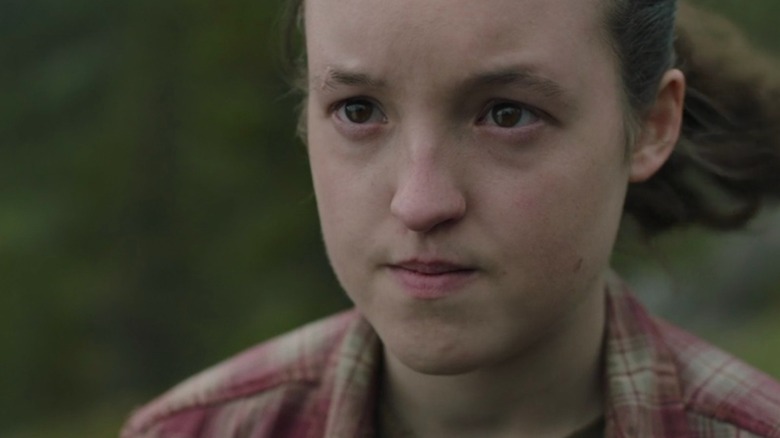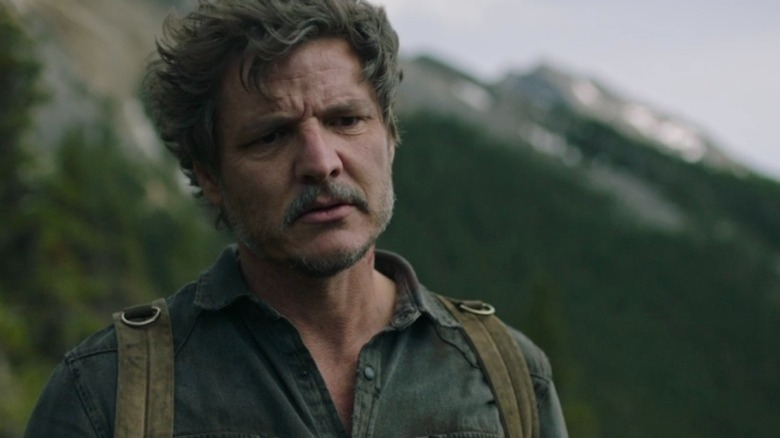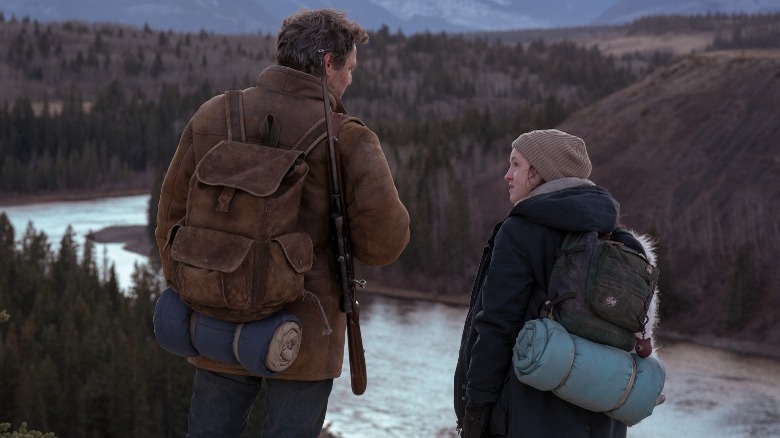The Last Of Us Showrunners Confirm Whether Ellie Believed Joel's Big Fat Lie In The Finale
This post contains spoilers for the season finale of "The Last of Us."
The end of "The Last Of Us" has always been ambiguous. Whether you're team "Joel did nothing wrong," think his slaughter of the Firefly scientists was unforgivable, or fall somewhere in between, the story ends on an ethically and emotionally loaded note. But it also ends with a tacit agreement; after clearly taking some time to mull over the possibility that her father figure is full of it, Ellie (Bella Ramsey) chooses to believe him when he swears his story is true.
Does Ellie really buy it, though, or is her thinly-veiled emotion in those last seconds a sign that she knows something went badly wrong? It's a question that audiences can answer for themselves, but series co-creators Craig Mazin and Neil Druckmann, who have been digging into the implications of the show's most subtle moments on its official companion podcast all year, sat down with host Troy Baker and ended up sharing their own interpretations once and for all.
'She will simply choose to believe it'
In short: Mazin and Druckmann say Ellie definitely didn't buy Joel's (Pedro Pascal) story. The smuggler told his cargo-turned-family that there are other immune people, that the Fireflies stopped looking for a cure, and that her missing clothes were thanks to raider attacks. While Ellie initially seems receptive to this story as she wakes up from anesthesia, she's stricken by guilt about the fact that she survived soon after. According to the show's co-creators, these final scenes point to the most obvious conclusion: on some level, she knows Joel is lying.
"I'm not sure if Ellie is saying you're lying to me and I'll move on, or you're lying and we're now changed forever in a negative way, or you're lying and it's incredibly important to you, and because I love you I won't dwell on it," Mazin tells the podcast. He adds that she also might be "so terrified of the truth that she wants to believe him." It's that emotionally raw open-endedness that made the end of "The Last Of Us" so powerful when it was released, and the implications of that final conversation carry over into the sequel as well.
"It can be any of those things, and that's why I love it," Mazin says of the ending. "There was never an option of her believing it. She will simply choose to believe it, and the why will come later." Ramsey, whose fantastic performance as Ellie has layered in both endearing naivety and unexpected world-weariness throughout the season, nails all of this with her lingering last look.
'She was already doing the math'
Druckmann also seems to think that look is doing a lot of heavy lifting. "I agree with each interpretation, and she's going through every one in her head, but at no point do we ever feel she believes the lie," he concludes on the podcast. "That is not on the table. She's already doing the math asking why Joel would possibly do all of this and the only reason could be because I was going to die." Druckmann points out that Ellie is smart, and while he thinks she "didn't know beforehand what would happen to her at the hospital," she's able to figure out roughly what might have happened after it becomes clear that Joel is lying.
Pascal, for his part, plays these last scenes with a perfectly uneasy desperation. He's wearing his typical level-headedness like a mask in hopes that Ellie won't see through it, but just as his emotional needs sneak through when he talks about teaching Ellie guitar like Sarah or regaining his will to live after meeting Ellie, it's clear here that he needs Ellie to believe him. The beauty of this story is that it didn't bring us all this way for some lofty, world-saving ending, but for us to understand this moment of connection — of needs met and fulfilled and demolished all at once — between the two broken people we've grown to love.


